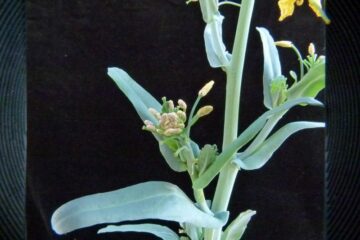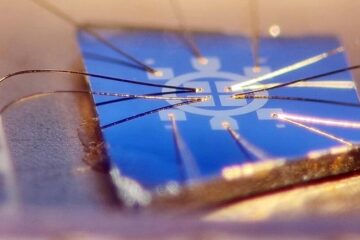Future 'quantum computers' will offer increased efficiency… and risks

An unusual observation in a University of Central Florida physics lab may lead to a new generation of “Quantum Computers” that will render today’s computer and credit card encryption technology obsolete.
The observations are documented this week in the online version of Nature Physics under Advance Online Publication (http://www.nature.com/nphys/index.html ). The title of UCF Professor Enrique del Barco’s paper is “Quantum Interference of Tunnel Trajectories between States of Different Spin Length in a Dimeric Molecular Nanogmagnet.”
Consumers, credit card companies and high-tech firms rely on cryptography to protect the transmission of sensitive information. The basis for current encryption systems is that computers would need thousands of years to factor a large number, making it very difficult to do.
However, if del Barco’s observation can be fully understood and applied, scientists may have the basis to create quantum computers — which could easily break the most complicated encryption in a matter of hours.
Del Barco said the observation may foster the understanding of quantum tunneling of nanoscale magnetic systems, which could revolutionize the way we understand computation.
“This is very exciting,” del Barco said. “When we first observed it, we looked at each other and said, ‘That can’t be right.’ We did it again and again and we achieved the same result every time.”
According to quantum mechanics, small magnetic objects called nanomagnets can exist in two distinct states (i.e. north pole up and north pole down). They can switch their state through a phenomenon called quantum tunneling.
When the nanomagnet switches its poles, the abrupt change in its magnetization can be observed with low-temperature magnetometry techniques used in del Barco’s lab. The switch is called quantum tunneling because it looks like a funnel cloud tunneling from one pole to another.
Del Barco published paper shows that two almost independent halves of a new magnetic molecule can tunnel, or switch poles, at once under certain conditions. In the process, they appear to cancel out quantum tunneling.
“It’s similar to what can be observed when two rays of light run into interference,” del Barco said. “Once they run into the interference you can expect darkness.”
Controlling quantum tunneling shifts could help create the quantum logic gates necessary to create quantum computers. It is believed that among the different existing proposals to obtain a practical quantum computer, the spin (magnetic moment) of solid-state devices is the most promising one.
“And this is the case of our molecular magnets,” del Barco said. “Of course, this is far from real life yet, but is an important step in the way. We still must do more research and a lot of people are already trying to figure this out, including us. It’s absolutely invigorating.”
Co-authors of the paper are Christopher Ramsey from UCF, Stephen Hill from the University of Florida and Sonali J. Shah, Christopher C. Beedle and David N. Hendrickson from the University of California at La Jolla.
Del Barco, who is a native of Spain, began teaching at UCF in 2005. He got a Ph. d degree from the University of Barcelona before moving onto New York University where he worked with Andrew Kent, a well-known quantum physicist.
It was the warm weather and the dynamic of UCF that drew him and his family to UCF. Aside from teaching physics and working on research, Del Barco is a published writer. He penned a science fiction novel that has been published in Spain by Editorial Equipo–Sirius. He collaborates with scientists from around the world including researchers in Spain, Hong Kong and across the United States.
Media Contact
More Information:
http://www.ucf.eduAll latest news from the category: Physics and Astronomy
This area deals with the fundamental laws and building blocks of nature and how they interact, the properties and the behavior of matter, and research into space and time and their structures.
innovations-report provides in-depth reports and articles on subjects such as astrophysics, laser technologies, nuclear, quantum, particle and solid-state physics, nanotechnologies, planetary research and findings (Mars, Venus) and developments related to the Hubble Telescope.
Newest articles

Boron deficiency: oilseed rape reacts as with infection and pest infestation
Genetic mechanisms uncovered… Boron deficiency has a devastating effect on oilseed rape and related plants. However, little is known about the underlying genetic mechanisms. A study shows that the response…

Quantum Precision: A New Kind of Resistor
Researchers at the University of Würzburg have developed a method that can improve the performance of quantum resistance standards. It´s based on a quantum phenomenon called Quantum Anomalous Hall effect….

Security vulnerability in browser interface
… allows computer access via graphics card. Researchers at Graz University of Technology were successful with three different side-channel attacks on graphics cards via the WebGPU browser interface. The attacks…





















